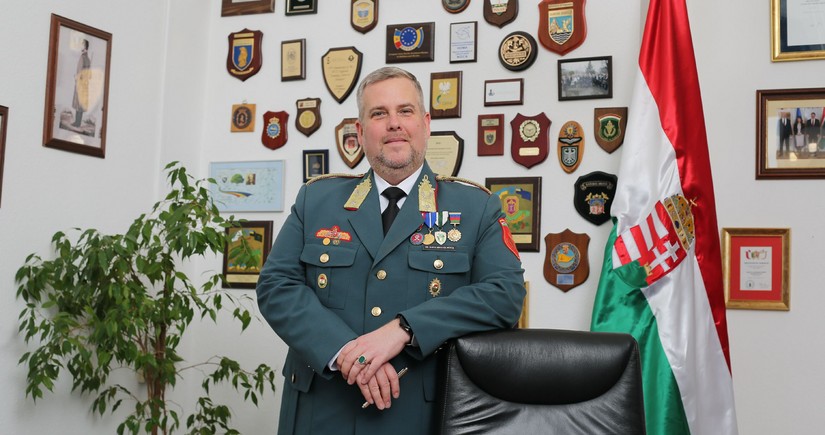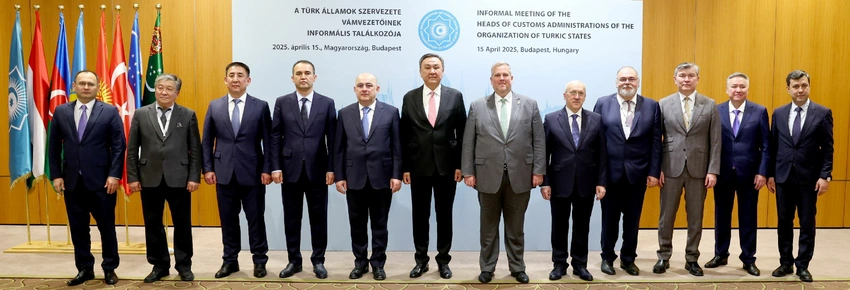Kristof Peter Bakai: Hungary's customs partnership with Azerbaijan strengthening integration of OTS with EU - INTERVIEW
- 26 May, 2025
- 11:34

The Organization of Turkic States (OTS) is gradually strengthening its position as one of the key centers of Eurasian integration. With its observer status in the OTS, Hungary is actively developing cooperation with the organization member states, including Azerbaijan. Striving for synergy between European standards and the Turkic vector of cooperation, Budapest promotes digitalization, combating cross-border offenses, and developing the human resources potential of customs authorities.
Strengthening the partnership between the National Tax and Customs Administration of Hungary (NTCA) and the State Customs Committee of Azerbaijan is of particular importance. In an interview with Report, Deputy Commissioner for Customs and International Affairs of the NTCA, Brigadier General Kristóf Péter Bakai spoke about the priorities of the Hungarian side within the OTS, prospects for institutionalizing bilateral cooperation, the significance of the visit to Baku and the potential for joint work in the field of digital solutions and personnel training.
We present the interview to readers:
- What are the main outcomes of the recent informal meeting of the heads of customs administrations of the Organization of Turkic States? Which key topics were emphasized during the discussions, and which proposals sparked the most interest among participants?
- Secretary General Kubanychbek Omuraliev emphasized Hungary’s active role and strategic engagement within the OTS, underlining the symbolic significance of hosting the meeting in Budapest ahead of the upcoming OTS Informal Summit of Heads of State. He also highlighted customs cooperation as a key OTS priority and noted the progress achieved, including the adoption of the eTIR Action Plan, the Simplified Customs Corridor, and ongoing initiatives like the Caravansarai Project. He called for closer collaboration with the European Union, leveraging Hungary’s unique experience to support the modernization and digitalization of customs procedures across the Turkic region.
The Hungarian side shared interesting geographical, historical, financial, and political facts about Hungary and also underlined Hungary’s active role in and contribution to the regional cooperation frameworks like V4 (Visegrád Cooperation) and CEFTA. A historical overview starting with the foundation of the European Community and noting the enlargements was introduced.
From a customs perspective, the importance of the Community Customs Code, the Modernized Customs Code, the Union Customs Code, as well as the Customs Reform Package and the related Roadmap between 2023-41. Finally, the result achieved and the tasks performed by the Hungarian customs during the EU Presidency were also highlighted. Participants from OTS Member States presented national experiences in customs modernization and regional economic cooperation.
The meeting also explored opportunities for enhanced collaboration within the OTS framework, with a focus on strengthening OTS–EU cooperation, knowledge exchange, and capacity building in the customs field.

- Were any preliminary agreements reached, or were specific directions outlined for deepening cooperation within the OTS framework? Are any joint initiatives in the customs sphere currently being planned?
- Useful experiences were shared regarding e-commerce, and there were numerous bilateral meetings in the framework of which the customs administrations had discussed the future steps of cooperation. The first informal meeting did not include any specific agreements; it focused mainly on general topics of mutual interest, with fruitful discussions to be continued at a later stage.
- A delegation from the National Tax and Customs Administration of Hungary is expected to visit Azerbaijan in the near future. When is the visit scheduled, and what are its primary objectives?
- Last year, unfortunately, we were unable to accept the invitation of H.E. Mr. Shahin Baghirov, Chairman of the State Customs Committee due to our commitments related to the Hungarian EU Presidency but later this year we are going to pay a visit to the Republic of Azerbaijan to have a high-level bilateral meeting, according to the plans, between 16-19 June. A high-level delegation of the NTCA is going to participate in the General Assembly of the Intra-European Organization of Tax Administrations (IOTA) to be held 17-19 June 2025, in Baku. This year, the President of the IOTA is the tax administration of the Republic of Azerbaijan, and they will host the GA, in the framework of which there will be an excellent opportunity to meet with the customs authorities as well. The primary objective of the aforementioned meeting is to review the bilateral cooperation, evaluate our past activities as well, and discuss key issues regarding future cooperation.
- Can we expect the signing of bilateral documents or agreements during the visit, aimed at institutionalizing cooperation between the customs authorities of the two countries?
- There is an agreement on customs cooperation, the preparation of which is in progress. More details can be found under point 5.
- How would you describe the current state and dynamics of cooperation between the customs services of Hungary and Azerbaijan? In which areas is collaboration developing most actively?
- As Hungary is a Member State of the EU, primarily the customs cooperation is carried out in the framework of the Partnership and Cooperation Agreement between the European Communities and their Member States, of the one part, and the Republic of Azerbaijan, of the other part - Protocol on mutual administrative assistance in customs matters. This cooperation proceeds smoothly.

It is also worth emphasizing the importance of developing and strengthening the cooperation between the two customs administrations by mutual exchange of knowledge, experience, and best practices in the field of the fight against customs offences. Our future bilateral activities’ main objective is to develop and strengthen cooperation between the customs administrations to prevent, investigate, and repress customs offences that harm the economic, fiscal, social, cultural, and commercial interests of their countries. We are convinced that close cooperation and quick response of the customs administrations would make the fight against customs fraud more efficient.
Our cooperation on the topic of service dog training shall be highlighted as well. The objective of this cooperation is to expand international relations in service dog training, exchange of experience on service dog training methods, and get to know the best practices of the customs administrations. There are several joint study visits each year.
- It is known that the parties are working on an interdepartmental agreement. What are the key provisions and mechanisms of interaction expected to be included in this document?
- Knowledge and expertise, public legislative and regulatory documents, and scientific and technical information can be exchanged pursuant to the draft text of the agreement planned to be concluded in June, except for that information which is considered to be classified information pursuant to the current applicable legislation.
- In light of modern challenges, which areas of cooperation do you consider a priority - information exchange, joint investigations, digitalization of procedures, or staff training and development?
As Hungary is a Member State of the EU, primarily the customs cooperation (including the exchange of information) is carried out in the framework of the Partnership and Cooperation Agreement between the European Communities and their Member States, of the one part, and the Republic of Azerbaijan, of the other part - Protocol on mutual administrative assistance in customs matters.
We are currently planning to share our digitalisation outcomes related to e-commerce with the customs administration of the Republic of Azerbaijan, focusing on the introduction of our in-house developed eVÁM system (which is meant to manage e-commerce shipments).
Beyond the above, we consider it important to work together in the field of staff training and development, to which our service dog training cooperation, mentioned in point 5, is a good example.

- Are there plans to establish mechanisms for regular and timely information exchange between our countries, particularly concerning the fight against smuggling and customs law violations?
- As Hungary is a Member State of the EU, primarily the customs cooperation is carried out in the framework of the Partnership and Cooperation Agreement between the European Communities and their Member States, of the one part, and the Republic of Azerbaijan, of the other part - Protocol on mutual administrative assistance in customs matters.
Exchange of best practices and useful experiences is of great importance, and we are currently working on a draft of an agreement, mentioned in point 6 in detail, which aligns with our obligations within the European Union.
- In your view, how important is the integration of customs infrastructure and digital solutions among OTS member states? Do you see the potential for creating a unified digital space to streamline customs procedures in the future?
- As Hungary is a Member State of the EU, where we have integrated systems to use, the integration within the OTS MSs can be beneficial, but it requires a thorough preparation process.
- What opportunities does Hungary’s observer status within the OTS offer in terms of expanding trade and economic ties, especially through transport and logistics routes passing through Azerbaijan?
- The Organization of Turkic States plays a key role in the construction of bridges between the East and the West. Therefore, cooperation between customs administrations is an essential element in maintaining global cooperation. Hungary pays special attention to the status of observer in the OTS, as recent geopolitical changes and challenges have significantly increased the importance of Central Asia and the Turkic world. Cooperation in customs and commerce is not just a technical issue, it is essential for our common well-being and long-term success. Strengthening this cooperation allows us to create more connected regions that are better prepared to address the challenges of the 21st century and take advantage of its potential. In 2012, the Hungarian Government announced the policy of the Eastern Opening. Our goal is to build reliable and long-term partnerships with OTS member states, including Azerbaijan.
